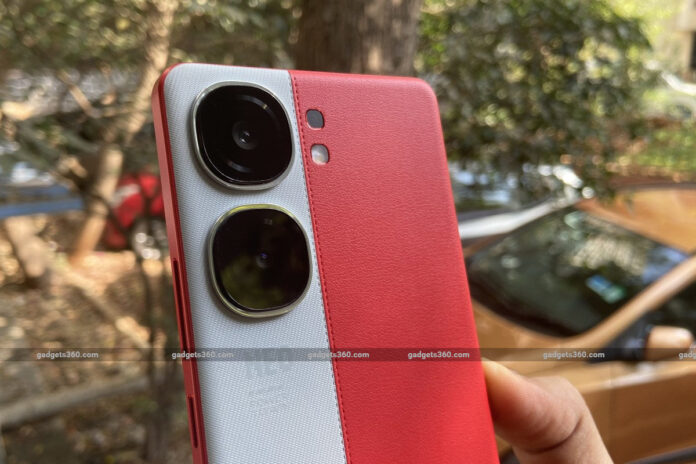The iQoo Neo 9 Pro is coming to India soon, and the company is already teasing the smartphone’s key specifications ahead of its debut. This phone boasts several notable specifications, including a dual rear camera setup that comprises a 50-megapixel primary camera and an 8-megapixel secondary camera. It is also powered by Qualcomm’s Snapdragon 8 Gen 2 chip, which was launched in late 2022. When the smartphone is launched in the country next week, it is expected to compete with phones like the OnePlus 12R and the Nothing Phone 2.
I’ve had some hands-on time with the iQoo Neo 9 Pro, and I’ve been testing the handset’s cameras for a few days now. Let’s take a quick look at the upcoming smartphone’s camera specifications. Unlike the more powerful iQoo 12 that the company launched in December 2023, this phone only features a dual rear camera setup. It has a 50-megapixel primary camera with a Sony IMX920 sensor and optical image stabilisation (OIS), paired with an 8-megapixel ultra-wide-angle camera.
![]()
The Textured mode results in images with more detail than the Natural mode (tap to enlarge)
You get three image-capturing modes on the iQoo Neo 9 Pro — Natural, Textured, and Vivid. As the names suggest, the first mode gives you the most colour-accurate images, while the Textured mode produces more detailed and sharpened images with warmer colours. The Vivid mode lets you capture photos with higher colour saturation.
While testing the cameras on the iQoo Neo 9 Pro, I found myself clicking photos using the primary camera with the Natural or Vivid mode for outdoor scenery, while the Textured mode is quite useful while clicking images of buildings or subjects where you need the camera to capture more detail. It also worked well when capturing indoor subjects.
![]()
Images captured using the primary camera and ultra-wide-angle camera (tap to enlarge)
The primary camera lets you take detailed images at 1x and 2x zoom. Colours are accurate when capturing images using the natural colour mode, but the Textured mode lets you get many details if you don’t mind the change in colour temperature. There’s also a high-resolution mode that takes 50-megapixel shots instead of the default pixel-binned images, which I’ll cover in my full smartphone review.
On the other hand, the ultra-wide-angle camera on the iQoo Neo 9 Pro lets you capture images with decent detail, but there’s some warping at the edges. This camera won’t offer the same level of detail as the primary camera, and there’s a difference in the colour temperature compared to the primary shooter.
![]()
Portrait images are clear, and the bokeh effect isn’t very aggressive (tap to enlarge)
Portrait images captured with the iQoo Neo 9 Pro are pretty sharp, with ample detail. The camera interface for portrait shots shows that the skin enhancement features are disabled by default. The bokeh effect isn’t too aggressive by default and can also be adjusted before and after capturing the image.
The handset also features a dedicated night mode, and it captures decent images using the primary camera. In a restaurant with dim overhead lights, the phone managed to capture a certain amount of detail, although there’s a bit of softening, blurring and noise if you zoom in — especially around light sources. I’ll also test the iQoo Neo 9 Pro’s camera in more challenging low light scenarios in the coming days.
![]()
The built-in night mode can capture images of dimly lit rooms (tap to enlarge)
It’s worth noting that these are my initial impressions of the handset’s camera, which is set to launch in India next week. The phone could also receive software updates in the days leading up to its debut. Stay tuned to Gadgets 360 for a more conclusive verdict on the iQoo Neo 9 Pro’s camera’s performance, as well as its design, performance, and battery efficiency — these will all be part of the full review of the smartphone.
Source link


